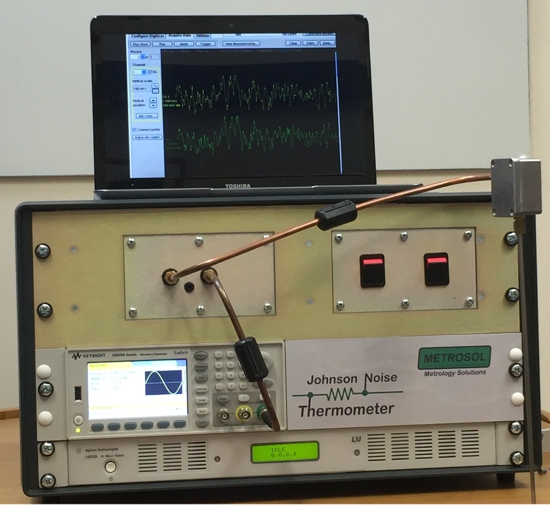|
Johnson noise in an ideal resistor is white,
meaning that the power spectral density is constant throughout
the frequency spectrum (except at extremely high frequencies).
As the Johnson noise is the results of many independent
charge carrier movements, the central limit theorem states
that the resulting noise voltage will have a normal or Gaussian
distribution.
The most important aspect of Johnson noise
from our point of view is that the power of the Johnson
noise is directly proportional to absolute temperature.
There is no material property or calibration requirement
to derive the absolute temperature, just electrical measurements.
Therefore, this technique is not subject to sensor drift.
How does measuring Johnson
Noise allow you to make a drift free thermometer?
By measuring the Johnson noise in a resistive
sensor together with the sensor resistance and measurement
bandwidth, the Johnson-Nyquist equation can be used to the
determine true thermodynamic temperature of the sensor completely
independent of the state of the sensor itself:

Why aren’t all thermometers
based on measuring Johnson noise?
The Johnson noise signal is extremely small
(comparable to the electrical noise in the best low-noise
amplifiers), making it extremely difficult to measure with
sufficient precision and also easily contaminated by electrical
noise in the environment. Many attempts to make a practical
JNT have been made since the arrival of modern electronics
era in the late 1950s, but none have so far led to a commercial
product due to the difficulties associated with the low
signal levels and the contamination of the signal by external
noise.
Metrosol in collaboration with the National
Physical Laboratory (NPL) are developing the world’s
first practical Johnson Noise Thermometer. This work started
in 2014 with a scoping and feasibility project, which lead
to a completely new technique for measuring Johnson noise
that was then patented and a demonstrator/proof of principle
prototype. The demonstrator operated over the range -20
to 120°C, used several commercial instruments in order
to make the measurements and weighed in at 35kg in a 70L
volume:

Contact us | View site map
|